|
|
Creator | Title | Description | Subject | Date |
| 1 |
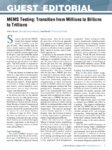 |
Roundy, Shadrach J. | MEMS testing: transition from millions to billions to trillions | Sensors, specifically MEMSbased, have created multiple market tornados over the past 40 years. Most recently there has been a market explosion driven by the widespread adoption of MEMS sensing devices in mobile consumer applications. In the past 5 years the worldwide market has grown from roughly 10... | | 2012-01-01 |
| 2 |
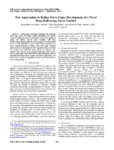 |
Gale, Bruce K. | New approaches to bridge nerve gaps: Development of a novel drug-delivering nerve conduit | Contemporary bridging techniques for repairing nerve gaps caused by trauma require autologous nerve grafts, which are difficult to harvest and handle and result in significant donor site deficit. Several nerve conduits with axon growth-enhancing potential have been proposed, developed and tested ove... | | 2012-01-01 |
| 3 |
 |
Adams, Daniel | Microbial production of methane and carbon dioxide from lignite, bituminous coal, and coal waste materials | The aim of this study was to examine microbial methane and CO2 production from bituminous coal waste, lignite, and bituminous coal materials. Bituminous coal and coal waste material were obtained from a Utah mine and lignite was obtained from a commercially available North Dakota sample. Microbial p... | | 2012-01-01 |
| 4 |
 |
Tran, Thomas T.D. | Thermoeconomic analysis of residential rooftop photovoltaic systems with integrated energy storage and resulting impacts on electrical distribution networks | This paper investigates residential rooftop photovoltaic (PV) systems for long-term thermoeconomic benefits from PV homeowners' perspectives and for impacts on the electrical distribution network from grid operators' perspectives. The costs of generating electricity from grid-connected PV systems ar... | Rooftop PV; Net Metering; Distribution Network; Energy storage; LCOE | 2018-07-07 |
| 5 |
 |
Smith, Amanda D. | Modeling two-phase flow and vapor cycles using the generalized fluid system simulation program | This work presents three new applications for the general purpose fluid network solver code GFSSP developed at NASA's Marshall Space Flight Center: (1) cooling tower, (2) vapor-compression refrigeration system, and (3) vapor-expansion power generation system. These systems are widely used across eng... | Modeling; Fluid systems; Cooling tower; Vapor compression refrigeration, vapor power cycle | 2017-09 |
| 6 |
 |
Horch, Kenneth W.; Lawrence, Steve M.; Dhillon, Gurpreet S. | Acute peripheral nerve recording characteristics of polymer-based longitudinal intrafascicular electrodes | We examined the recording characteristics of two different types of polymer-based longitudinal intrafascicular electrodes (LIFEs) in peripheral nerve: single-stranded (s-polyLIFEs) and multistranded (m-polyLIFEs). Recordings were also made from Pt-Ir wire-based electrodes (PtIrLIFEs) as a control. T... | Sciatic Nerve; Intrafascicular Electrodes, Peripheral Nerve Recording | 2004 |
| 7 |
 |
Guilkey, James Edward | Improved velocity projection for the Material Point Method | The standard velocity projection scheme for the Material Point Method (MPM) and a typical form of the GIMP Method are examined. It is demonstrated that the fidelity of information transfer from a particle representation to the computational grid is strongly dependent on particle density and locati... | Material Point Method; GIMP Method; Meshless methods; Velocity projection; Solid mechanics | 2007 |
| 8 |
 |
Thomas, Tran T. D. | Evaluation of renewable energy technologies and their potential for technical integration and cost-effective use within the U.S. energy sector | Energy demands, environmental impacts of energy conversion, and the depletion of fossil; fuels are constant topics of discussion in the energy industry. Renewable energy technologies; have been proposed for many years to address these concerns. However, the transformation; from traditional methods o... | Renewable energy; Power generation; Electrical grid; Emerging energy systems; System integration | 2017-07 |
| 9 |
 |
Tran, Thomas T. D. | System scaling approach and thermoeconomic analysis of a pressure retarded osmosis system for power production with hypersaline draw solution: A Great Salt Lake study | Osmotic power with pressure retarded osmosis (PRO) is an emerging renewable energy option for locations where fresh water and salt water mix. Energy can be recovered from the salinity gradient between the solutions. This study provides a comprehensive feasibility analysis for a PRO power plant in a ... | Pressure retarded osmosis; Power generation; Renewable energy; Hydroelectric; Levelized cost | 2017-06 |
| 10 |
 |
Normann, Richard A.; Johansson,Torbjorn; Abbasi, Masoud; Huber, Robert J. | Three-dimensional architecture for a parallel processing photosensing array | A three-dimensional architecture for a photosensing array has been developed. This silicon based architecture consists of a 10 x 10 array of photosensors with 80 microns diameter, through chip interconnects to the back side of a 500 microns thick silicon wafer. Each photosensor consists of a 300 x 3... | Retina; Optics; Silicon; Photosensing | 1992 |
| 11 |
 |
Horch, Kenneth W.; Dhillon, Gurpreet S. | Direct neural sensory feedback and control of a prosthetic arm | Evidence indicates that user acceptance of modern artificial limbs by amputees would be significantly enhanced by a system that provides appropriate, graded, distally referred sensations of touch and joint movement, and that the functionality of limb prostheses would be improved by a more natural co... | Peripheral Nerve Implant; Prosthetic Limb Control; Sensory Feedback | 2005-12 |
| 12 |
 |
Legorburu, Gabriel | Energy modeling framework for optimizing heat recovery in a seasonal food processing facility | Societal, cultural and economic factors are driving food processors to reduce energy consumed per unit mass of food. This presents a unique problem because time variant batch processing using low to medium grade heat is common in food production facilities. Heat recovery methods may be implemented b... | Energy efficiency; Food industry; Heat recovery; Optimization; Simulation | 2018-07-20 |
| 13 |
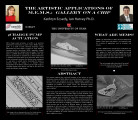 |
Ecsedy, Kathryn Lyn; Harvey, Ian R. | The artistic applications of M.E.M.S.: gallery on a chip | Our research explored the crossroads between art and science to create tiny devices known as MEMS (Micro Electrical Mechanical Systems). These artistic devices are powered by micro charge-pumped actuation of electrons in a scanning electron microscope, utilizing a phenomenon once considered an irri... | Artistic applications; MEMS; Micro Electrical Mechanical Systems; Kinetic micro sculpture; Micro charge pump actuation; Trapeze Interactive Poster | 2010-03-15 |
| 14 |
 |
Tran, Thomas T.D. | Incorporating performance-based global sensitivity and uncertainty analysis into LCOE calculations for emerging renewable energy technologies | Assessing system costs for power generation is essential for evaluating the economical aspect of energy resources. This paper examines traditional and renewable energy resources under uncertainty and variability of input variables. The levelized cost of electricity (LCOE) of each technology is compu... | Renewable energy technologies; LCOE levelized cost of electricity | 2018-02-14 |
| 15 |
 |
Jayamohan, Harikrishnan | Novel titania nanotube based electrochemical detection in micrototal analysis system | We report the modification of titania (TiO2) nanotubes for quantitative electrochemical (EC) detection of biomolecules on a microfluidic platform. | Microfluidics; Titania nanotubes; Electrochemical detection | 2015 |
| 16 |
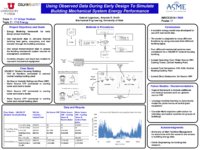 |
Legorburu, Gabriel | Using Observed Data During Early Design To Simulate Building Mechanical System Energy Performance | | Energy Modeling; Real-World Data; Neural Networks | 2019 |
| 17 |
 |
Didier, Richard C. | Linking microclimate and energy use with a low cost wall mounted measurement system | Urban microclimate plays a critical role in overall urban energy demand and efficiency. At the building scale, energy use and internal conditions are directly impacted by local microclimate. The direct link between building energy use and local microclimate is through building envelope heat fluxes. ... | Microclimate; Energy; Temperature; Humidity; Arduino; EnergyPlus | 2016-06 |
| 18 |
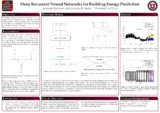 |
Rahman, Aowabin | Deep recurrent neural networks for building energy prediction | This poster illustrates the development of a deep recurrent neural network (RNN) model using long-short-term memory (LSTM) cells to predict energy consumption in buildings at one-hour time resolution over medium-to-long term time horizons ( greater than or equal to 1 week). | Machine learning; Energy; Building energy modeling; Deep learning; Recurrent neural networks; Prediction | 2017-01-13 |
| 19 |
 |
Smith, Amanda D. | Performance modeling and parametric study of a stratified water thermal storage tank | Thermal energy storage (TES) can significantly increase the overall effciency and operational flexibility of adistributed generation system. A sensible water storage tank is an attractive option for integration in building energy systems, due to its low cost and high heat capacity. As such, this pap... | | 2016-02-13 |
| 20 |
 |
Rahman, Aowabin | Predicting electricity consumption for commercial and residential buildings using deep recurrent neural networks | This paper presents a recurrent neural network model to make medium-to-long term predictions, i.e. time horizon of ≥ 1 week, of electricity consumption profiles in commercial and residential buildings at one-hour resolution. Residential and commercial buildings are responsible for a significant fr... | Building Energy Modeling; Machine learning; Recurrent neural networks; Deep learning; Electric load prediction | 2017 |
| 21 |
 |
Bianchi, Carlo | Energy demands for commercial buildings with climate variability based on emission scenarios | The impacts of a changing climate are wide-ranging in both impact and scope. This paper investigates the effect that realistic climate variability would have on building energy demands in Salt Lake City, UT to inform planning for air quality impacts. Energy demand scenarios were derived using climat... | BEM; EnergyPlus; Emissions; Climate; Energy | 2017 |
| 22 |
 |
Jayamohan, Harikrishnan | Applications of microfluidics for molecular diagnostics | Diagnostic assays implemented in microfluidic devices have developed rapidly over the past decade and are expected to become commonplace in the next few years. Hundreds of microfluidics-based approaches towards clinical diagnostics and pathogen detection have been reported with a general theme of ra... | Microfluidics; Micro-total-analysis-systems; Lab-on-a-chip; Point-of-care devices; Sample preparation; MEMS; Rapid prototyping; Biomarker detection; Personalized medicine; Global health care | 2012-11-04 |
| 23 |
 |
Ameel, Timothy A; Gale, Bruce K.; Harvey, Ian R. | A three-semester interdisciplinary educational program in microsystems engineering | Motivated by an NSF IGERT grant in the general area of microfluidics, a sequence of three interdisciplinary technical courses has been developed in the emerging area of microsystems engineering. Designed to be taken in series, these courses take students, both graduate and upper-level undergraduates... | | 2004 |
| 24 |
 |
Adams, Daniel | Micromechanical modeling of high energy composites | High-energy polymer-binded explosives (PBXs) are composed of high-energy crystaline particles and a rubbery binder. The volume fraction of particles is approximately 92 percent. The high-energy particles have a Young's modulus that is three orders of magnitude higher than that of the binder. Eff... | | 2000 |
| 25 |
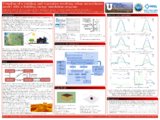 |
Bianchi, Carlo | Coupling of building and vegetation resolving urban microclimate model with a building energy simulation program | The objective of this work is to develop and validate a coupled fast-running Building Energy Modeling/Microclimate model for use in developing site-specific design strategies which minimize energy and water use All the micro-climate variables affecting the building energy consumption, such as solar ... | Building energy modeling; Urban; Microclimate; Simulation; Energy; Environment | 2018-08 |

























